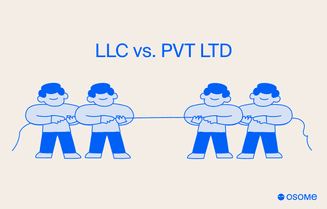Pte Ltd vs LLC: How to Choose the Right Business Structure
- Modified: 16 September 2025
- 15 min read
- Starting a Company


Heather Cameron
Author
From expert guidance and helpful accounting tips to insights on the latest trends in fintech, Heather is here to empower entrepreneurs and small business owners in Singapore with great content. With a background in digital marketing spanning eight years, she has experience writing for various industries and audiences. As Osome’s copywriter, she’s here to inform and inspire our readers with great storytelling.

Nisah Rahim
Reviewer
Nisah Rahim is our go-to expert reviewer for all things Corporate Secretary-related in Singapore. As the Corporate Secretary Team Lead and content reviewer, Nisah meticulously examines our blog posts to ensure we provide comprehensive information on Corporate Secretary services such as local regulatory compliance, managing board meetings, maintaining company records, and providing expert advice on corporate governance matters.

Imran Marican
Reviewer
Imran Marican, ATA SCTP member, is our Corporate Tax Assistant Manager based in Singapore, with almost a decade of experience in Singapore corporate tax. With in-depth knowledge of Singapore corporate tax law and regulations, he can help with corporate tax compliance that matters to every company. While our business writers transform complicated tax jargon into easy-to-understand concepts, as a reviewer for the Osome blog, Imran ensures our content is accurate and relevant, helping our readers boost their businesses with helpful tips and insights.
When comparing Pte Ltd (Private Limited Company) vs LLC (Limited Liability Company), understanding their major differences is crucial for making an informed decision. This article covers key points such as liability protection, tax implications, and capital-raising capabilities of private limited companies and LLCs in Singapore.
Key Takeaways
- A private limited company (Pte Ltd) offers a distinct legal identity and liability protection, allowing for independent operation and safeguarding of the personal assets of shareholders, whereas a limited liability company (LLC) provides flexible management and ownership but is subject to varying state regulations.
- Tax implications differ significantly. Private limited companies in Singapore enjoy a flat corporate tax rate of 17% with additional exemptions. While LLCs in Singapore are also subject to corporate tax rates, their specific tax implications can vary depending on their structure and business activities.
- Capital raising is more accessible for Pte Ltd through public share offerings, enhancing growth potential, while LLCs face limitations in investment opportunities due to restrictions on the public trading of shares.
Understanding Pte Ltd and LLC
When choosing the right business structure, understanding the fundamental differences between Pte Ltd and LLC is crucial.
A Pte Ltd, or Private Limited Company, is a preferred business structure in Singapore, characterised by its status as a separate legal entity and a maximum of 50 shareholders, making it a type of private company limited.
On the other hand, an LLC, or Limited Liability Company, is widely used in the USA and offers flexibility combined with limited liability companies' personal liability protection.
Compared to sole proprietorship, both Pte Ltd and LLC structures are more appealing business entities for entrepreneurs seeking to safeguard their personal assets.
Knowing these structures helps in making an informed decision, as they differ in:
- Legal identity
- Liability protections
- Taxes
- Ownership transfer processes
Starting a private limited company in Singapore can be a complex process. Osome understands it and offers efficient company incorporation services. Our team of experienced professionals can guide you through every step of the incorporation process, from registering your business to ensuring you comply with all relevant regulations. Don't hesitate to reach out and learn more!

These key characteristics significantly impact how each structure operates and what it offers to business owners. For instance, a private limited company's status as a separate legal entity or business entity allows it to enter contracts and own assets independently of its shareholders, thus providing a layer of protection for personal assets.
The limited liability company structure in the USA offers flexibility and adaptability, accommodating various ownership and management styles. Exploring each structure further will help in understanding their nuances.
What is a Pte Ltd?
A Private Limited Company (Pte Ltd) is one of the most popular business entities in Singapore, known for its separate legal identity and protection from liability. The separate legal identity means that the company can engage in legal and financial activities independently of its shareholders, such as entering contracts and owning property. Typically, a Pte Ltd has between 1 and 20 individual shareholders and can have up to a maximum of 50 shareholders. This structure is particularly favoured by entrepreneurs for its scalability and the clear separation it maintains between personal and corporate assets.
Shareholders in private limited companies are only liable for the company’s debts up to the amount they have invested, safeguarding their personal assets from business liabilities. This protection, coupled with the concept of perpetual succession, ensures that the company can continue to operate regardless of changes in ownership or shareholding.
These features make Pte Ltd an attractive option for those looking to build a resilient and scalable business.
What is an LLC?
A Limited Liability Company, or LLC, is a flexible business structure that combines the liability protection of a S corporation or C corporation with the operational simplicity of a limited liability partnership (LLP). This flexibility allows for various management and ownership styles, accommodating the specific needs of the business and its members. Unlike Pte Ltd entities, which are subject to Singapore’s uniform regulations, limited liability companies are governed by state-specific regulations in the USA, leading to a variety of operational and regulatory requirements depending on the state. Unlike a sole proprietorship or limited partnership, an LLC can be treated as a disregarded entity for tax purposes.
The management structure of a limited liability company or limited liability partnership can be customised to fit the business’s needs. Members can choose to be directly involved in the day-to-day operations (Member-Managed) or appoint managers to handle these responsibilities (Manager-Managed). This adaptability makes limited liability companies an attractive option for businesses that require a flexible management framework.
Additionally, LLCs offer significant protection against personal liabilities, ensuring that members’ personal assets are safeguarded from business debts. For businesses preferring corporate taxation, LLCs can also elect to be treated as an S corporation or C corporation, offering greater flexibility in financial and tax planning.
An LLC can elect to be taxed as a C corporation, providing the benefits of a traditional corporate structure while maintaining operational flexibility, hence the name Limited Liability Company.
Legal Identity and Liability Protection
The separate legal identity and protection from liability offered by a business structure are critical considerations for any entrepreneur. Both Pte Ltd and LLC structures establish a legal separation between the business and its owners, which is essential for protecting personal assets from business liabilities. This separation is not just a legal formality; it provides a crucial layer of risk management that can safeguard owners’ personal wealth.
In both structures, the company is treated as a distinct legal entity or business entity, capable of owning assets, incurring liabilities, and entering into contracts independently of its owners. This status as distinct business entities is a significant advantage, particularly for businesses looking to scale and protect their assets. Unlike a sole proprietorship, Pte Ltd and LLC structures enable businesses to separate corporate funds from personal finances, ensuring clearer financial accountability and protection.
Separate legal identity
The separation of legal identity is a key advantage of both Pte Ltds and LLCs, making them popular choices for businesses in Singapore.
A Private Limited Company (Pte Ltd) in Singapore is a separate legal entity from its shareholders. This means it can own property, enter into contracts, and sue or be sued in its own name. This separation provides a significant layer of protection for the company's shareholders, as their personal assets are not directly liable for the company's debts.
Similarly, an LLC in Singapore, while less common, also enjoys a separate legal personality. This means it can conduct business independently of its members, protecting one or more members from being held personally liable.
Limited liability protection
The limited liability protection offered by both Pte Ltd and LLC structures ensures that shareholders and members are only liable for company debts up to the amount they have invested. This legal framework is vital for risk management, as it shields shareholders' personal assets from business creditors. In the event of bankruptcy or legal claims against the company, the personal wealth of shareholders in a Pte Ltd company remains protected.
In an LLC, this protection is equally robust. Members’ personal assets are safeguarded from business liabilities, meaning creditors cannot pursue personal assets to satisfy business debts. The limited liability feature is a significant advantage for both structures, providing peace of mind to the company's owners that their personal financial exposure is limited. This is a key distinction from a sole proprietorship or limited partnership, where personal assets may still be at risk in the event of business debts.
This protection is particularly valuable for small businesses and entrepreneurs who may not have extensive resources to cover business liabilities.
Tax Implications and Benefits of Pte Ltd and LLC
Tax considerations are crucial in choosing between a private limited company and a limited liability company. They significantly influence the decision-making process. Both structures offer distinct tax benefits and implications that can significantly impact the profitability and financial management of your business. For instance, Singapore’s flat corporate income tax rate of 17% for Pte Ltd companies is coupled with various tax incentives and exemptions.
Additionally, Singapore offers various tax incentives and exemptions, such as a start-up tax exemption, partial tax exemption and tax deductions for research and development expenses. These incentives can significantly reduce a company's overall tax liability.
It's important to note that while both private limited companies and limited liability companies are subject to the same corporate tax rate, their specific tax implications can vary based on factors like their ownership structure, business activities, and eligibility for tax incentives. LLCs can also choose to be taxed as an S corporation or C corp, providing additional options to optimise tax efficiency based on their business model and financial goals.
The table below contains the tax exemptions for companies in Singapore.
Start-up tax exemption | Partial tax exemption |
|---|---|
| First S$ 100,000 exempted at 75% = S$ 75,000 | First S$ 10,000 exempted at 75% = S$ 7,500 |
| Next S$ 100,000 exempted at 50% = S$ 50,000 | Next S$ 190,000 exempted at 50% = S$ 95,000 |
| Total Exemption = S$ 125,000 | Total Exemption = S$ 102,500 |
Let’s delve deeper into these tax considerations to see how they affect each business structure.
Corporate tax rates
Pte Ltd companies in Singapore benefit from a competitive corporate tax rate of 17%, along with partial tax exemptions on the first S$ 100,000 of chargeable income. This favourable tax environment makes Singapore an attractive destination for entrepreneurs looking to maximise their after-tax profits. Additionally, Singapore's single-tier tax policy eliminates double taxation on dividends, ensuring that shareholders receive their returns without additional tax burdens like personal income tax rates. These tax incentives enhance the overall profitability of Pte Ltd business entities. In contrast to the fixed corporate tax rate for Pte Ltd companies, any S corporation and C corporation have distinct tax structures, with an S corporation offering all the tax benefits you might expect and a C corporation taxed at the corporate level.
A C corporation, unlike a pass-through entity, is taxed at the corporate level and again on shareholder dividends, hence the name 'double taxation.'
Always consult with a tax professional to determine the most suitable structure and tax implications for your specific business needs, regardless of the jurisdiction.
Pass-through taxation vs corporate taxes
One of the significant advantages of LLCs is the option for pass-through taxation, which allows profits to be taxed at the individual owner’s personal income tax rates rather than at the corporate level. This means that LLCs typically do not pay taxes at the business level, avoiding the double taxation that can occur with corporate structures. This can lead to lower overall tax liabilities for limited liability company members, making it an attractive option for many small businesses and entrepreneurs.
Conversely, Pte Ltd companies in Singapore are subject to corporate taxes on their profits, although they may qualify for various tax exemptions and incentives. Newly incorporated Pte Ltd companies, for instance, may enjoy a tax exemption on their first S$ 100,000 of chargeable income for the first three consecutive years.
While this can reduce the effective tax rate, Pte Ltd companies still face corporate tax liabilities, which can result in higher overall tax burdens compared to LLCs.
Pte Ltd vs LLC: Capital Raising and Investment Opportunities
The ability to raise capital and attract investment is a crucial factor in the growth and scalability of any business. Pte Ltd entities generally have an advantage in this area due to Singapore’s supportive economic environment and the ability to offer shares to the public. This separate business entity status and scalability make private limited companies a preferred choice for entrepreneurs looking to expand their operations.
In contrast, LLCs often face limitations in capital raising due to regulatory constraints that restrict public trading of their shares. While LLCs can still attract investments through private placements and the issuance of membership interests, these methods may not provide the same level of capital inflow as public offerings.
Let’s explore these key differences further to understand how each structure can impact your business’s growth potential.
Raising capital through public shares
One of the significant advantages of Pte Ltd companies is the ability to raise capital through the public offering of shares. This process allows businesses to tap into larger pools of investment, thereby accelerating growth and expansion. Public limited companies, including Pte Ltd, can increase their capital significantly by getting investments from the general public, which is facilitated by favourable economic policies in Singapore.
By offering shares traded publicly on the stock exchange, Pte Ltd companies can attract a broader range of investors, enhancing their growth potential in the stock exchange. This method of raising capital through a stock exchange is particularly advantageous for businesses looking to scale rapidly and secure substantial funding for their projects.
The ability to offer shares to the public is a key differentiator for Pte Ltd, providing a robust mechanism for capital accumulation. While private limited companies can access all the benefits of public share offerings, including increased liquidity and capital inflow, LLCs generally rely on private placements due to their limitations in public trading.
Investment restrictions for LLCs
While LLCs provide flexibility in many aspects, they do face certain limitations when it comes to raising capital. Unlike Pte Ltd companies, LLCs cannot issue publicly traded shares, which restricts their ability to attract investment from the general public. Instead, LLCs typically try raising capital through private placements or by issuing membership interests. This means that the pool of potential investors is smaller, and often limited to private investors or venture capitalists.
Moreover, the process of raising capital for LLCs can be more complex due to regulatory constraints and the need for detailed operating agreements. These agreements must be amended to reflect new members and their ownership stakes, adding an additional layer of complexity to the investment process.
While LLCs can still attract significant investment, the lack of public trading options can limit their growth potential compared to Pte Ltd companies. Additionally, LLCs considering growth through investments must carefully navigate the registration process and registration fees associated with modifying their operating agreements to accommodate new members.
Structure and Ownership Differences Between Pte Ltd and LLC
The structural and ownership dynamics of Pte Ltd and LLC vary significantly, impacting their operational flexibility and business management. Pte Ltd companies offer a more straightforward ownership transfer process compared to LLCs. This ease of transfer promotes continuity and stability, essential for ongoing business operations.
Meanwhile, the legal structure of LLCs is highly flexible, allowing for various setups depending on the members’ preferences. LLCs often provide greater flexibility in ownership compared to structures like sole proprietorships or limited partnerships.
For instance, the simpler ownership transfer process in Pte Ltd can facilitate smoother transitions during changes in shareholding, while the flexible business structures of LLCs can accommodate diverse business needs. Let’s dive deeper into the specifics of organisational structure and ownership transfer for both entities.

Management structure
LLCs offer a flexible management framework that can be tailored to fit the specific needs of the business and its members. Members can choose to actively manage the business (Member-Managed) or appoint managers to handle daily operations (Manager-Managed). This flexibility allows LLCs to adapt their structure as the business evolves, providing a dynamic approach to business operations.
In contrast, the business structures of Pte Ltd companies typically involve a Board of Directors who oversee the company’s operations, with shareholders playing a significant role in major decisions. This formalised company structure can provide clear oversight and direction, which is beneficial for maintaining corporate governance and accountability.
The structured approach of Pte Ltd can be advantageous for businesses that require a more formalised management system.
Ownership transfer process
The process of transferring ownership in a Pte Ltd is relatively straightforward, often involving the transfer of shares. This simplicity facilitates business continuity and allows for smoother transitions during changes in ownership. The ease of transferring shares in Pte Ltd promotes stability and scalability, making it an attractive option for businesses anticipating future growth. Pte Ltds benefit from the streamlined share transfer system governed by the Companies Act in Singapore, ensuring smoother transitions compared to LLCs that often require more complex adjustments.
On the other hand, ownership transfer in an LLC can be more complex, often governed by state-specific regulations and detailed operating agreements. The transfer typically requires an amendment to reflect the new ownership structure, which can be a cumbersome process.
Additionally, state laws can further complicate the transfer process, making it less straightforward compared to Pte Ltd. This complexity can impact the flexibility and ease of transitioning ownership in a limited liability company (LLC).
Regulatory Compliance and Annual Requirements
Maintaining regulatory compliance is essential for any business to ensure its legal and operational status. Both Pte Ltd and LLC structures have specific compliance requirements that must be adhered to. In Singapore, Pte Ltd companies are required to comply with various annual filing obligations to remain in good standing with local laws. Similarly, LLCs in the USA must meet state-specific regulatory requirements, including annual reports and tax returns.
Recognising these compliance obligations ensures that your business operates smoothly and avoids legal pitfalls. While the specific requirements may vary between Pte Ltd and LLC, the importance of adhering to these regulations cannot be overstated. For instance, unlike disregarded entities or a sole proprietorship, Pte Ltd companies are required to file financial statements adhering to the Singapore Financial Reporting Standards (SFRS).
Examining the compliance requirements for each structure in more detail will provide clearer insights.
Compliance for Pte Ltd
Pte Ltd companies in Singapore must adhere to a range of regulatory compliance requirements to maintain their legal status. This includes appointing a company secretary within six months of incorporation and maintaining a registered office address that is open to the public for at least three hours each business day. Additionally, Pte Ltd companies must notify the Accounting and Corporate Regulatory Authority (ACRA) of any changes in shareholders, share capital, or officers within a specified timeframe.
Annual compliance requirements for Pte Ltd include holding an Annual General Meeting (AGM) within a stipulated period after the financial year ends and filing annual returns with ACRA. Financial statements must be prepared following the Singapore Financial Reporting Standards (SFRS), ensuring transparency and adherence to local accounting standards. These requirements are essential for maintaining the company’s legal and operational status.
Compliance for LLC
Compliance for LLCs in Singapore involves adhering to various regulations set by the Accounting and Corporate Regulatory Authority (ACRA). This includes maintaining a registered office address in Singapore, filing annual returns, and conducting annual general meetings. While not legally mandatory, it is highly recommended to have a written constitution, similar to an operating agreement, to outline the company's business structure, decision-making processes, and shareholder rights.
Additionally, LLCs must comply with specific industry regulations and tax obligations. This may involve obtaining licenses or permits, filing tax returns, and adhering to corporate governance best practices. By fulfilling these compliance requirements, LLCs can ensure their long-term sustainability and avoid potential penalties.
Need help setting up a private limited company? Osome can help you to register your business and make it compliant! Contact us today to learn more about how we can help you choose the right business structure and navigate the incorporation process.
Summary
Choosing the right business structure is a critical decision that can have far-reaching implications for your company’s legal standing, tax obligations, and growth potential. Pte Ltd and LLC each offer unique advantages and come with their own set of regulatory and operational challenges. Pte Ltds are ideal for businesses looking for scalability and clear legal separation between personal and corporate assets, while LLCs offer flexibility and tax benefits.
In summary, understanding the key differences between Pte Ltd and LLC can help you make an informed decision that aligns with your business goals. Whether you prioritise ease of capital raising, flexible management structures, or specific tax benefits, the insights shared in this guide will equip you with the knowledge needed to choose the best business structure for your needs. Making the right choice now can set the foundation for your business’s long-term success and stability.






